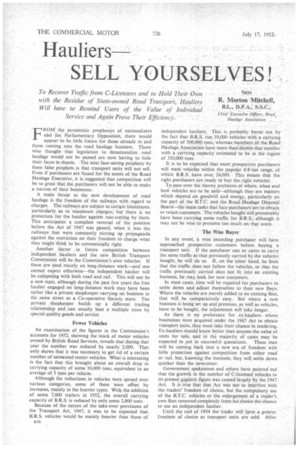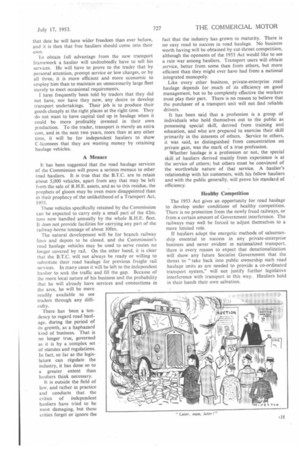Hauliers SELL YOURSELVES!
Page 50

Page 53

If you've noticed an error in this article please click here to report it so we can fix it.
To Recover Traffic from C-Licensees and to Hold Their Own with the Residue of State-owned Road Trans. port, Hauliers Will have to Remind Users of the Value of Individual Service and Again Prove Their Efficiency.
FROM the pessimistic prophesies of nationalizers aticl the Parliamentary Opposition, there would appear to be little future for those already in and those coming into the road haulage business. Those who thought that legislation to denationalize , road haulage would not be passed are now having to hide their faces in shame. • The next face-saving prophesy by these false prophets is that transport units will not sell. Even if purchasers are found for the assets of the Road Haulage Executive, it is suggested that competition will be so great that the purchasers will not be able to make a success of their businesses.
A main threat to the new development of road haulage is the freedom of the railways with regard to charges. The railways are subject to certain limitations, particularly as to maximum charges; but there is no protection for the haulier against rate-cutting by them. This anticipates a complete reversal of the position before the Act of 1947 was passed, when it was the railways that were constantly stirring up propaganda against the restriction on their freedom to charge what they might think to be commercially right.
Another factor . in future competition between independent hauliers and the new British Transport Commission will be the Commission's own vehicles. If these are used mainly on long-distance work—and one cannot expect otherwise—the independent haulier will be competing with both road and rail. This will not be a new state, although during the past few years the free haulier engaged on long-distance work may have been rather like a private shopkeeper carrying on business in the same street as a Co-operative Society store. The private shopkeeper builds up a different trading relationship and can usually beat a multiple store by special-quality goods and service.
Fewer Vehicles
An examination of the figures in the Commission's accounts for 1952, showing the stock of motor vehicles owned by British Road Services, reveals that during that year the number was reduced by nearly 2,000. That only shows that it was necessary to get rid of a certain number of unwanted motor vehicles. What is interesting is the fact that this brought about an overall drop in carrying capacity of some 10,000 tons, equivalent to an average of 5 tons per vehicle.
Although the reductions in vehicles were spread over various categories, some of these were offset by increases, mainly in the heavier types. With the addition of some 7,000 trailers in 1952, the overall carrying capacity of B.R.S. is reduced by only some 2,800 tons.
Because of the nature of the take-over provisions of the Transport Act, 1947, it was to be expected that B.R.S. vehicles would be mainly heavier than those of
independent hauliers. This is. probably borne out by, the fact that B.R.S. run 39,000 vehicles with .a carrying. capacity of 300,000 tons,' whereas: membets.of.the Road: Haulage Association have more than double that number with a carrying capacity estimated to be in the region • of 350,000 tons.
It is to be expected that most prospective purchasers will want. vehicles within the popular 4-8-ton range, of which B.R.S. have over 24,000. This means that the right purchasers are ready to buy the right vehicles. , To-pass over the thorny problems of where, when and how vehicles are to be sold—although they arc matters which depend on goodwill and energy, particularly on the part of the B.T.C. and the Road Haulage Disposal Board—the main tasks that face purchasers are to obtain or retain customers. The vehicles bought will presumably have been carrying some traffic for B.R.S., although it may not be wise to presume too much on that score.
The Wise Buyer
In any event, a wise intending purchaser will have approached prospective customers before buying a transport unit. If the purchaser can or cares to carry . the same traffic as that previously carried by the vehicles bought, he will do so. If, on the other hand, he finds that the traffic does not follow the vehicles, or that the traffic previously carried does not fit into an existing business, he may, look for new customers.
In most cases, time will be required for purchasers to settle down and adjust themselves to their new fleets. Where the vehicles are merely added to an existing fleet, that will be comparatively easy. But where a new business is being set up and premises, as well as vehicles, have to be bought, the adjustment will take longer.
As there is no preference for ex-hauliers whose businesses were acquired under the 1947 Act to obtain • transport units, they must take their chance in tendering. Ex-hauliers should know better than anyone the value of units for sale, and in the majority of cases may be expected to put in successful quotations. These men will be coming back into a new era of freedom with little protection against competition from either road or rail, but, knowing the business, they will settle down quicker than the newcomer.
Government spokesmen and others have pointed out that the growth in the number of C-licensed vehicles to its present gigantic figure was caused largely by the 1947. Act. It is true that that Act was not to interfere with the traders' freedom of choice, but the compulsory use of the B.T.C. vehicles or the enlargement of a trader's_ own fleet removed completely from his choice the chance • to use an independent haulier.
Until the end of 1954 the trader will have a greater freedom of choice as transport units are sold. After that date he will have wider freedom than ever before, and it is then that free hauliers should come into their own.
To obtain full advantage from the new transport framework a haulier will undoubtedly have to sell his services. He will have to prove to the trader that by personal attention, prompt service or low charges, or by all three, it is more efficient and more economic to employ him than to maintain an unnecessarily large fleet merely to meet occasional requirements.
I hav,e frequently been told by traders that they did not have, nor have they now, any desire to develop transport undertakings. Their job is to produce their goods cheaply at the right places at the right time. They do not want to have capital tied up in haulage when it could be more profitably invested in their own production. To the trader, transport is merely an extra cost, and in the next two years, more than at any other time, it will be for independent hauliers to show C-licensees that they are wasting money by retaining haulage vehicles.
A Menace It has been suggested that the road haulage services of the Commission will prove a serious menace to other road hauliers. It is true that the B.T.C. are to retain about 5,000 vehicles, apart from any that may be left from the sale of R.H.E. assets, and as to this residue, the prophets of gloom may be even more disappointed than in their prophecy of the unlikelihood of a Transport Act, 1953.
These vehicles specifically retained by the Commission can be expected to carry only a small part of the 42m, tons now handled annually by the whole R.H.E. fleet. It does not provide facilities for carrying any part of the railway-borne tonnage of about 300m.
The natural development will be for branch railway lines and depots to be closed, and the Commission's road haulage vehicles may be used to serve routes no longer covered by rail. On the other hand, it is clear that the B.T.C. will not always be ready or willing to substitute their road haulage for previous freight rail services. In many cases it will be left to the independent haulier to seek the traffic and fill the gap. Because of the more local nature of his business and the probability that he will already have services and connections in the area, he will be more readily available to see traders through any difficulty.
There has been a tendency to regard road haulage, during the period of its growth, as a haphazard kind of business. That is no longer true, governed as it is by a complex set of statutes and regulations. In fact, so far as the legislature can regulate the industry, it has done so to a greater extent than hauliers think necessary.
It is outside the field of law, and rather in practice and conducts that the critics of independent hauliers have tried to be most damaging, but these critics forget or ignore the fact that the industry has grown to maturity. There is no easy road to success in road haulage. No business worth having will be obtained by cut-throat competition, although the oponents of the 1953 Act would like to see a rate war among hauliers. Transport users will obtain service, better from some than from others, but more efficient than they might ever have had from a national integrated monopoly.
Like every other busihess, private-enterprise road haulage depends for much of its efficiency on good management, but to be completely effective the workers must play their part. There is no reason to believe that the purchaser of a transport unit will not find reliable drivers.
It has been said that a profession is a group of individuals who hold themselves out to the public as possessing special skill, derived from training and education, and who are prepared to exercise their skill primarily in the interests of others. Service to others, it was said, as distinguished from concentration on private gain, was the mark of a true profession.
Whether haulage is a profession or not, the special skill of hauliers derived mainly from experience is at the service of others; but others must be convinced of the worthwhile nature of that service. A haulier's relationship with his customers, with his fellow hauliers and with the public generally, will prove his standard of efficiency.
Healthy Competition
The 1953 Act gives an opportunity for road haulage to develop under conditions of healthy competition. There is no protection from the newly freed railways, or from a certain amount of Government interference. The railways may well be forced to adjust themselves to a more limited role.
If hauliers adopt the energetic methods of salesmanship essential to success in any private-enterprise business and never evident in nationalized transport, there is every reason to expect that denationalization will show any future Socialist Government that the threat to "take back into public ownership such road haulage units as are needed to provide a co-ordinated transport system," will not justify further legislative interference with transport in this way. Hauliers hold in their hands their own salvation.




















































































